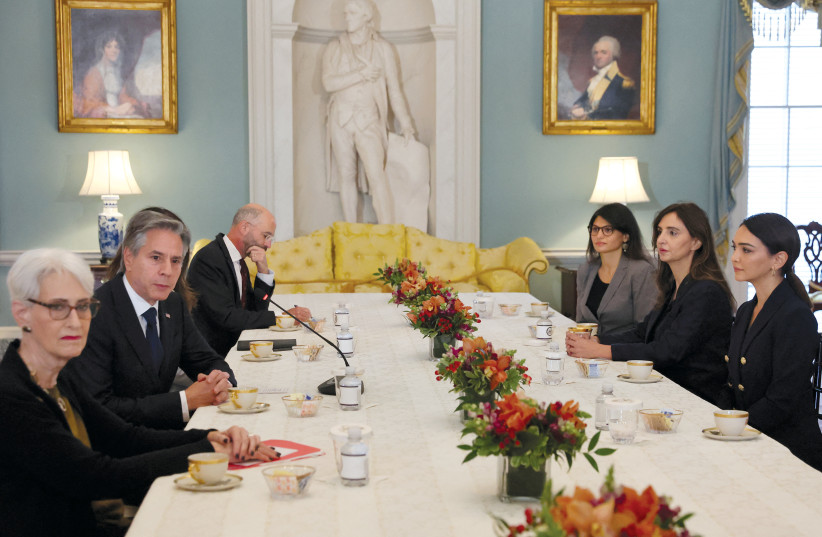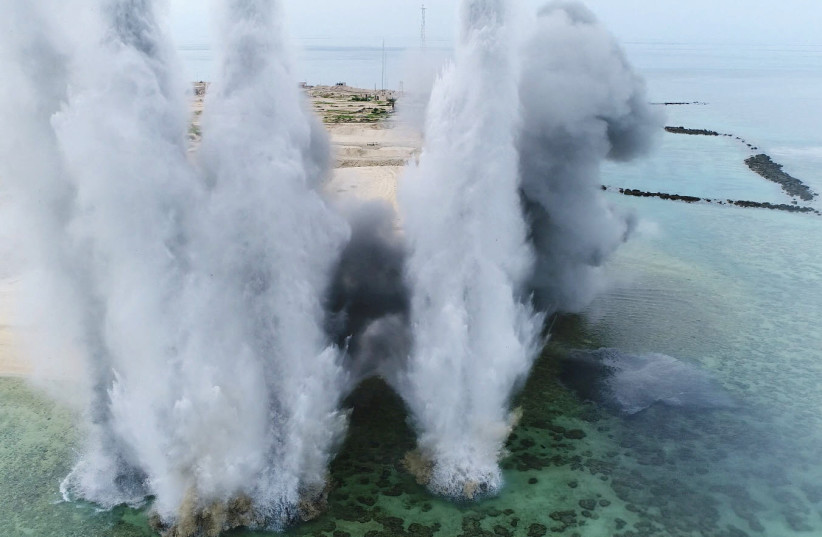Israel has taken “one huge step” toward entering the US Visa Waiver Program, US Ambassador Tom Nides said on Monday, announcing that Israel’s visa refusal rate is under 3%.
That 3% benchmark is one of three steps Israel needs to take to join 40 other countries whose citizens can enter the US for short-term stays without a visa.
The other steps include passing three laws in the Knesset dealing with data sharing, and a reciprocity agreement, meaning that just as Israelis will be able to visit the US visa-free, so too can Palestinian-Americans fly to Ben-Gurion Airport and drive to visit relatives in the West Bank. Likewise, Palestinians holding American passports will be allowed to fly out of Ben-Gurion Airport.
The timing of the announcement – just hours before US Secretary of State Antony Blinken met in Jerusalem with Prime Minister Benjamin Netanyahu – was not coincidental. Israel has wanted to join the Visa Waiver Program for years, and the announcement that one major hurdle has been cleared is a goodwill measure convenient for the Americans to put on the table before Blinken’s meeting.
“Here is what we are doing for you,” this gesture seems to say. Americans critical of Israel and opposed to letting it in on the Visa Waiver Program might ask, “And what exactly is Israel doing for us?”

One timely answer was provided Sunday in the Wall Street Journal and on Monday in the New York Times, as US officials were cited as saying that Israel was responsible for the Saturday night drone attack in the Iranian city of Isfahan that reportedly did considerable damage to a key military/industrial facility there. Isfahan is a center for Iran’s missile industry.
Frustrations in partnership
Interestingly, this facility was not clearly identified with Iran’s nuclear program, so attacking it does not per se set back Iran’s nuclear program, which long has been one of Israel’s premier goals. Although it was not immediately clear what role the facility played, Iran has delivered drones to Russia for its war against Ukraine, and Moscow is reportedly also trying to obtain Iranian missiles.
“The US has been pressing Israel to do more to help Ukraine in its war with Russia, especially now that Tehran is providing Moscow with hundreds of drones used to attack Ukraine,” the Wall Street Journal wrote.
And the New York Times, in a preview it published of Blinken’s visit to Jerusalem, wrote, “Israel has also been a frustrating partner for the Biden administration on its most pressing priority: the war in Ukraine.”
What has been frustrating for the Americans and the Ukrainians has been Israel’s reluctance to provide weaponry to Ukraine. The reason for Israel’s reluctance is twofold.
First, Jerusalem is concerned about infuriating the Russians who, because of their presence in Syria, could conceivably take out their anger by acting against Israeli steps to keep Iran from creating a forward base inside the country.
Secondly, because of concern that some of the weaponry Israel would deliver to Ukraine would likely fall into Russian hands, and Moscow would share information about that weaponry with their new military allies: the Iranians.
After the attack, Mark Dubowitz chief executive officer of the Foundation for Defense of Democracies, a Washington-based think tank, tweeted this: “To all those who like to criticize Israel for not doing enough to help Ukraine, you can send your apologies c/o of Mossad, Unit 8200, and the IDF.”
Dubowitz was quoted in the Wall Street Journal story saying, “This is a smart trifecta where Israel can hurt Iran, help Ukraine, and not risk its strategic interests in Syria or run the risk of diverting its sensitive military technology to Russia and into Iran.”
There was a time when US officials leaking to journalists about Israel’s alleged involvement in actions to thwart Iran – so-called “outing Israel” – was seen as an expression of exasperation with Jerusalem and a way of embarrassing it.
But given the close cooperation between Israel and the US these days regarding Iran, now that a reinstated Iran nuclear deal is not in the immediate offing, and due to the fact that the Isfahan target does not appear linked to Iran’s nuclear program, the leak to the two US papers seems less like an effort to embarrass or complicate matters for Israel, and more like a signal to Iran. While Israel and the US may be at odds over the Iranian nuclear deal, they are definitely on the same page regarding concern over a burgeoning Iranian-Russian military alliance.
The attack in Isfahan took place just days after the US and Israel finished their largest ever military drill – Channel 12 reporting that this included a simulated attack against a mock Iranian nuclear facility – and just a couple of days after CIA chief William Burns visited Jerusalem. All that led to speculation that if Israel was responsible for the drone attack in Isfahan, it is unlikely – considering the timing – that it was done without American knowledge.

On Sunday, a number of refrigerator trucks in a convoy in eastern Syria near the Iraqi border, believed to be carrying Iranian arms to Iran’s proxies in the region, were destroyed in an airstrike that foreign sources also attributed to Israel.
If Israel was indeed responsible for both strikes, the timing of the latter so soon after the Isfahan attack is telling. One might have thought that Israel would be concerned that actions against Iran’s missile production capabilities could enrage the Russians, interested in obtaining Iranian missiles and that this would prompt Moscow to take action to stop Israeli action inside Syria. An attack on an Iranian arms convoy inside Syria would indicate, however, that if Israel did carry out the operation, it was not overly concerned about Russian interference.
If Israel was responsible for the attacks, it indicates something else as well: that last month’s change of government did not alter the military action Jerusalem is willing to take to thwart Iran, and that Netanyahu will continue a policy put into place by then prime minister Naftali Bennett to not only act again Iran’s proxies – in Bennett’s words the “tentacles of the octopus” – but rather to hit as well at the “head of the octopus” itself, meaning to strike inside Iran when necessary.
